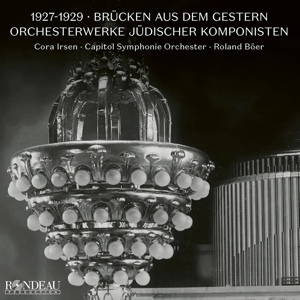
1927-1929 • Brücken aus dem Gestern
Orchestral Works by Jewish Composers
Bernhard Sekles (1872-1934)
Der Dybuk, Op 35 (1928)
Juliusz Wolfsohn (1880-1944)
Hebräische Suite for piano and orchestra (1928)
Jaromir Weinberger (1896-1967)
Vánoce (1929)
Werner Richard Heymann (1896-1961)
Scene Music for Silent Films (1927-28, reconstructed by Marco Jovic)
Cora Irsen (piano), Capitol Symphony Orchestra/Roland Böer
rec. 2021, Capitol Theatre, Offenbach, Germany
Rondeau Production ROP6233 [68]
Weimar Germany is a suitable cauldron for examination in this disc, which presents the works of four Jewish composers, only one of which sounds ‘Jewish’. The work that ought to sound Jewish is Bernhard Sekles’ Der Dybuk though it turns out, rather, to be an attractively expressive tone poem on the legend of the soul-sapping Dybbuk. Sekles was an interesting character, who inaugurated the first Jazz class at a German conservatory (at Frankfurt, where he was the musical director) and numbered Theodor Adorno among his many students. Premiered in 1928 by Hans Rosbaud, another of Sekles’ students, it’s an eight-minute setting that is strong in its wind writing and cast in a late-Romantic aura.
Composer and concert pianist Juliusz Wolfsohn’s Hebräische Suite for piano and orchestra was also written in 1928 but originated two years earlier as a work for solo piano. Each of the four movements carries a descriptive title – With the Miracle Rabbi, Circle Dance, Love Song, Wedding Dance – and there are strong, Eastern elements, sinuous, slow and adeptly orchestrated, though Wolfsohn wasn’t known as much for his orchestral music. The scherzo-like energy of the Circle Dance with scampering piano, is a highlight, whilst the Love Song is gently ardent, I’d say, with the strings dappling around the protagonist warmly. The freilach of the last panel is a Wedding Dance that begins slowly and is then swept up in measured excitement. It’s an entertaining suite though it does have a strong aroma of the casually decorative about it.
Jaroslav Weinberger’s Vánoce is called Weihnachten in German as the Czech composer wrote it for Clemens von Franckenstein, director of the Bavarian State Opera in 1929. It was first performed in November that year by the Munich Philharmonic but was a long-time favourite on Czech Radio where it was performed ever year until the German takeover a decade later. John Barbirolli’s live performance in New York in 1941 exists and its popularity extended across the Atlantic. This is another tone poem, in effect, based on Bohemian themes and celebrating Christmas. It’s beautifully orchestrated and pretty well played here and the organ is audible in the climax.
The final music is by Werner Richard Heymann, a luminary of the Berlin silent film world. Most of his large film scores are lost but some small pieces survive. These little pieces were intended for films for which there was no pre-existing music and were orchestrated by the Frenchman Julien Porret, Heymann’s exact contemporary, and are heard here in reconstructions by Marco Jovic. They cover the intended kind of brief scenes well – all-purpose and zesty mood music at its most apropos in the last of the four, a syncopated Weimar Petite Grotesque complete with jaunty trombones.
The Capitol Symphony plays these pieces well – strongly in the case of Heymann – and are well directed by Roland Böer. Cora Irsen negotiates the demands of the Wolfsohn. The documentation is in German with English translation and the recording impactful. Because of the very different nature of the pieces it’s a tricky disc to recommend unreservedly, but it’s an easy disc to enjoy.
Jonathan Woolf
Buying this recording via a link below generates revenue for MWI, which helps the site remain free.



















